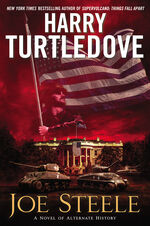| ||||||||||||||||||||||||||||||||||
Pierce Butler (March 17, 1866 – November 16, 1939) was an American jurist who served as an Associate Justice of the Supreme Court of the United States from 1923 until his death in 1939. He is notable for being the first justice from Minnesota, and for being a Democrat appointed by a Republican President, namely Warren G. Harding.
Pierce Butler in Joe Steele[]
Justice Pierce Butler (1866-1934) was one of the so-called "Supreme Court Four", a group of justices on the United States Supreme Court who overturned most of the legislation passed as part of President Joe Steele's Four Year Plan.[1] In response, Steele conferred with Bureau of Investigation Chief J. Edgar Hoover to investigate the justices.[2] Then Steele gave a radio speech in which he denounced the Supreme Court as nine old men who were not elected, and who were actively wrecking the country. Steele implied the Court's actions were deliberate, and promised that there would be an investigation.[3]
Hoover discovered "evidence" that four justices, Butler, James McReynolds, George Sutherland, and Willis Van Devanter, were in fact colluding with Nazi Germany against the United States. In February 1934, Hoover led a group of agents to very publicly arrest the Supreme Court Four for treason while they were in the middle of deliberations.[4] For good measure, President Steele suspended the writ of habeas corpus immediately after, insuring that the Four remained in custody until their trial.[5]
The Four faced a military tribunal in September 1934. Upon the beginnings of the proceedings, Justice James McReynolds informed the tribunal that he wished to enter a guilty plea and throw himself upon their mercy. The ACLU attorneys attempted to object, claiming the confession was coerced, which AG Wyszynski denied. Captain Spruance questioned McReynolds, who denied any coercion and claimed he received adequate treatment. Spruance then turned to the other three judges, who also admitted their guilt. McReynolds stated for the record that they believed that Steele was the "American Trotsky",[6] and that colluding with the Nazis was the best way to keep the U.S. a democracy.[7] Justice Sutherland added that they weren't the only ones, and named Louisiana Senator Huey Long and radio personality and Steele critic, Father Coughlin.[8].
The tribunal went into recess to deliberate. That afternoon, the tribunal unanimously found the Four guilty, and sentenced them to execution by firing squad.[9] Their attorneys pledged to appeal. With few options, the ACLU appealed to the remaining Supreme Court and to President Steele, and published letters in the newspapers.[10] Ultimately, Steele denied their appeal, and the Four were executed at sunrise some weeks after their conviction. [11]
Literary comment[]
In the short story, Pierce Butler and the other judges are called the "Gang of Four", but meet the exact same fate as in the novel. Their trial is more detailed in the novel.
References[]
| Political offices (OTL) | ||
|---|---|---|
| Preceded by William R. Day |
Associate Justice of the United States Supreme Court December 21, 1922-November 16, 1939 |
Succeeded by Frank Murphy |
| Political offices (Joe Steele) | ||
| Preceded by William R. Day |
Associate Justice of the United States Supreme Court 1922-1934 |
Succeeded by Unknown |
| |||||||||||||||||||

